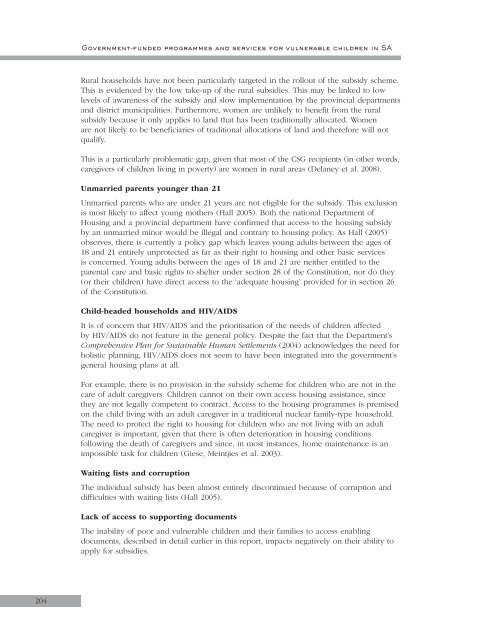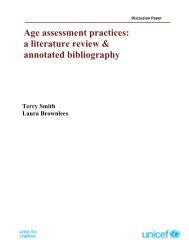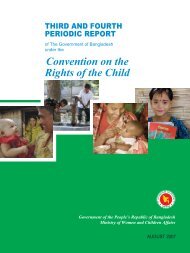Government-funded programmes and services for vulnerable - Unicef
Government-funded programmes and services for vulnerable - Unicef
Government-funded programmes and services for vulnerable - Unicef
You also want an ePaper? Increase the reach of your titles
YUMPU automatically turns print PDFs into web optimized ePapers that Google loves.
<strong>Government</strong>-<strong>funded</strong> <strong>programmes</strong> <strong>and</strong> <strong>services</strong> <strong>for</strong> <strong>vulnerable</strong> children in SA<br />
Rural households have not been particularly targeted in the rollout of the subsidy scheme.<br />
This is evidenced by the low take-up of the rural subsidies. This may be linked to low<br />
levels of awareness of the subsidy <strong>and</strong> slow implementation by the provincial departments<br />
<strong>and</strong> district municipalities. Furthermore, women are unlikely to benefit from the rural<br />
subsidy because it only applies to l<strong>and</strong> that has been traditionally allocated. Women<br />
are not likely to be beneficiaries of traditional allocations of l<strong>and</strong> <strong>and</strong> there<strong>for</strong>e will not<br />
qualify.<br />
This is a particularly problematic gap, given that most of the CSG recipients (in other words,<br />
caregivers of children living in poverty) are women in rural areas (Delaney et al. 2008).<br />
Unmarried parents younger than 21<br />
Unmarried parents who are under 21 years are not eligible <strong>for</strong> the subsidy. This exclusion<br />
is most likely to affect young mothers (Hall 2005). Both the national Department of<br />
Housing <strong>and</strong> a provincial department have confirmed that access to the housing subsidy<br />
by an unmarried minor would be illegal <strong>and</strong> contrary to housing policy. As Hall (2005)<br />
observes, there is currently a policy gap which leaves young adults between the ages of<br />
18 <strong>and</strong> 21 entirely unprotected as far as their right to housing <strong>and</strong> other basic <strong>services</strong><br />
is concerned. Young adults between the ages of 18 <strong>and</strong> 21 are neither entitled to the<br />
parental care <strong>and</strong> basic rights to shelter under section 28 of the Constitution, nor do they<br />
(or their children) have direct access to the ‘adequate housing’ provided <strong>for</strong> in section 26<br />
of the Constitution.<br />
Child-headed households <strong>and</strong> HIV/AIDS<br />
It is of concern that HIV/AIDS <strong>and</strong> the prioritisation of the needs of children affected<br />
by HIV/AIDS do not feature in the general policy. Despite the fact that the Department’s<br />
Comprehensive Plan <strong>for</strong> Sustainable Human Settlements (2004) acknowledges the need <strong>for</strong><br />
holistic planning, HIV/AIDS does not seem to have been integrated into the government’s<br />
general housing plans at all.<br />
For example, there is no provision in the subsidy scheme <strong>for</strong> children who are not in the<br />
care of adult caregivers. Children cannot on their own access housing assistance, since<br />
they are not legally competent to contract. Access to the housing <strong>programmes</strong> is premised<br />
on the child living with an adult caregiver in a traditional nuclear family-type household.<br />
The need to protect the right to housing <strong>for</strong> children who are not living with an adult<br />
caregiver is important, given that there is often deterioration in housing conditions<br />
following the death of caregivers <strong>and</strong> since, in most instances, home maintenance is an<br />
impossible task <strong>for</strong> children (Giese, Meintjies et al. 2003).<br />
Waiting lists <strong>and</strong> corruption<br />
The individual subsidy has been almost entirely discontinued because of corruption <strong>and</strong><br />
difficulties with waiting lists (Hall 2005).<br />
Lack of access to supporting documents<br />
The inability of poor <strong>and</strong> <strong>vulnerable</strong> children <strong>and</strong> their families to access enabling<br />
documents, described in detail earlier in this report, impacts negatively on their ability to<br />
apply <strong>for</strong> subsidies.<br />
204
















